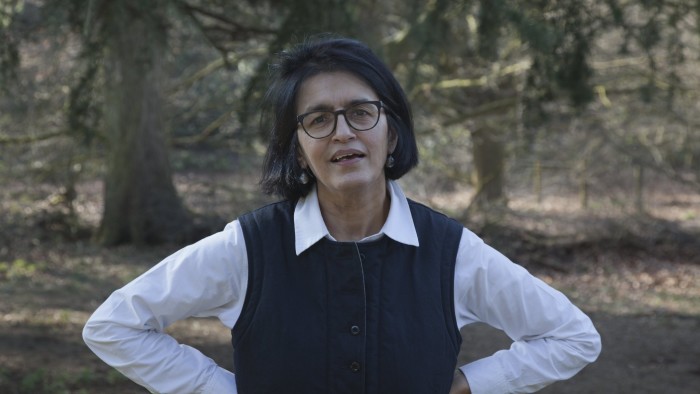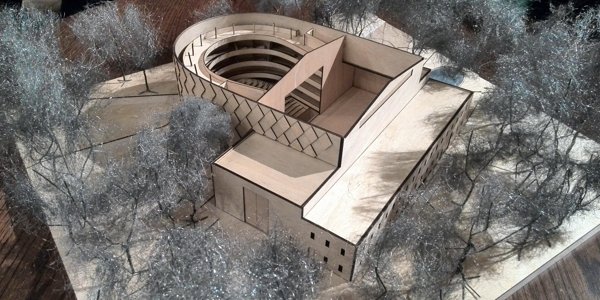Grange Park Opera’s new £10m plot

Simply sign up to the Life & Arts myFT Digest -- delivered directly to your inbox.
Standing on the edge of an 18th-century walled garden, Wasfi Kani takes a breath, opens her lungs and begins to sing “Deh vieni, non tardar”, Susanna’s exquisite aria from The Marriage of Figaro. Her voice suddenly fills the air, swelling and reverberating in the natural acoustic of the enclosed bare plot.
“Isn’t it wonderful?” she says, relishing the final notes as they dissipate in the spring air.
It is a perfect demonstration of Kani’s ability to conjure a scene of romantic high culture in what is, in fact, an empty space — a skill she will need in abundance as she executes an ambitious plan to construct a new £10m country house opera venue in the south of England, without public funding or planning permission (as yet) and with little more than a year before the curtain is due to come up on the opening performance.
In spite of the scale of the task, Kani appears undaunted — because she has done it before. Founder and chief executive of Grange Park Opera, she raised more than £3m in 2002 to transform a decrepit neoclassical orangery on the estate of the Baring family in Northington Grange, Hampshire, into an opera venue, building a summer festival to bear comparison with Glyndebourne and Garsington.
But after a falling-out with the Barings over the terms of a new lease, this summer’s performance of Tristan und Isolde will be the last the company gives at the Orangery — a moment she predicts will be “very poignant”.
It also presented her with a problem. Top performers for opera festivals are typically booked three or four years ahead, so Kani found herself in urgent need of a venue for her 2017 season, which is to open on June 8 with Tosca, starring the Maltese tenor Joseph Calleja.
So she has come to West Horsley Place, a 15th-century manor house set in 300 acres of rolling farmland and woods near Guildford, Surrey. The Grade 1 listed building was the home of Mary, Duchess of Roxburghe, but when she died in 2014 at the age of 99, it passed — to his surprise — to her great-nephew, the broadcaster Bamber Gascoigne.
In search of productive uses for the 50-room house and estate, Gascoigne made the property over to the Mary Roxburghe Trust, as a performance centre and a place for the study of arts and crafts, and — and with a love of opera — has given his blessing to Kani’s vision. Confusingly, Kani is retaining Grange Park Opera as the name of the opera company, even though it will no longer perform at Grange Park. GPO is a registered charity funded by ticket sales and donations.
At its new home, visitors to GPO will enter through the mature gardens, walking among a series of box-bordered green spaces until they reach a gate in the mighty “crinkle crankle” garden walls of 1710. “I’ve got more picnic spots than I know what to do with,” Kani says.
Beyond, in an area currently thick with brambles, willow, ash and oak, will be her horseshoe-shaped, 650-seat Theatre in the Woods, which she describes as a “drum with decorated brickwork”, echoing the elaborate exterior of the main house, designed by GPO’s architectural consultant David Lloyd Jones, TRA and Ramboll. The first performances will take place in an incomplete shell, shrouded in scaffolding, but Kani argues this will work in her favour. “It’s easier to raise money for an unfinished building. People love going on a journey.”
Kani’s formidable reputation as a fundraiser is evident: since she began picking up the phone in November, she has confirmed pledges for about half the £10m, including a promise of £1m which arrived days after our meeting. “I’ve yet to send out a piece of printed material,” she says. The philanthropist Dame Vivien Duffield is co-chair of the appeal board, and she has also had advice from Niall FitzGerald, former Unilever head and now chair of the Leverhulme Trust, as well as John Botts, chairman of Glyndebourne.
Besides tapping personal connections for larger cheques and exploiting her database of 25,000 names, she is offering naming rights for every conceivable architectural aspect of the theatre.
“If you give £20,000 you can have a step named after you. For £50,000 you can have your name on one of 13 columns. If you give £100,000 you can have a row [of seats]. Boxes are £200,000. The atrium is £1m.” She is also looking for 2,000 gifts of £1,000, for which donors will have their name inscribed on a scroll in the theatre, at the top of which is the bass-baritone Bryn Terfel.

The quest for local supporters has prompted her to create what she calls “Surrey hubs” — well-connected opera fans who invite groups of likely potential donors into their homes to hear opera excerpts from professional singers, plus Kani’s fundraising pitch, over the course of an evening. “I have to get Surrey interested,” she says. To assist her “show and tell” she has had a model of the theatre made, which she keeps in a shoebox lined with red felt.
Having speedily raised the first wave of funds — the “low-hanging fruit”, as she puts it — does she worry that wider economic uncertainty and worries over issues such as Brexit will slow her race to the target? Not at all, she says: donors are motivated primarily by the attractions of the fundraising project, whatever the economic conditions. “The world’s full of uncertainty but . . . people are genuinely interested in creating something for the public good.”
Comments